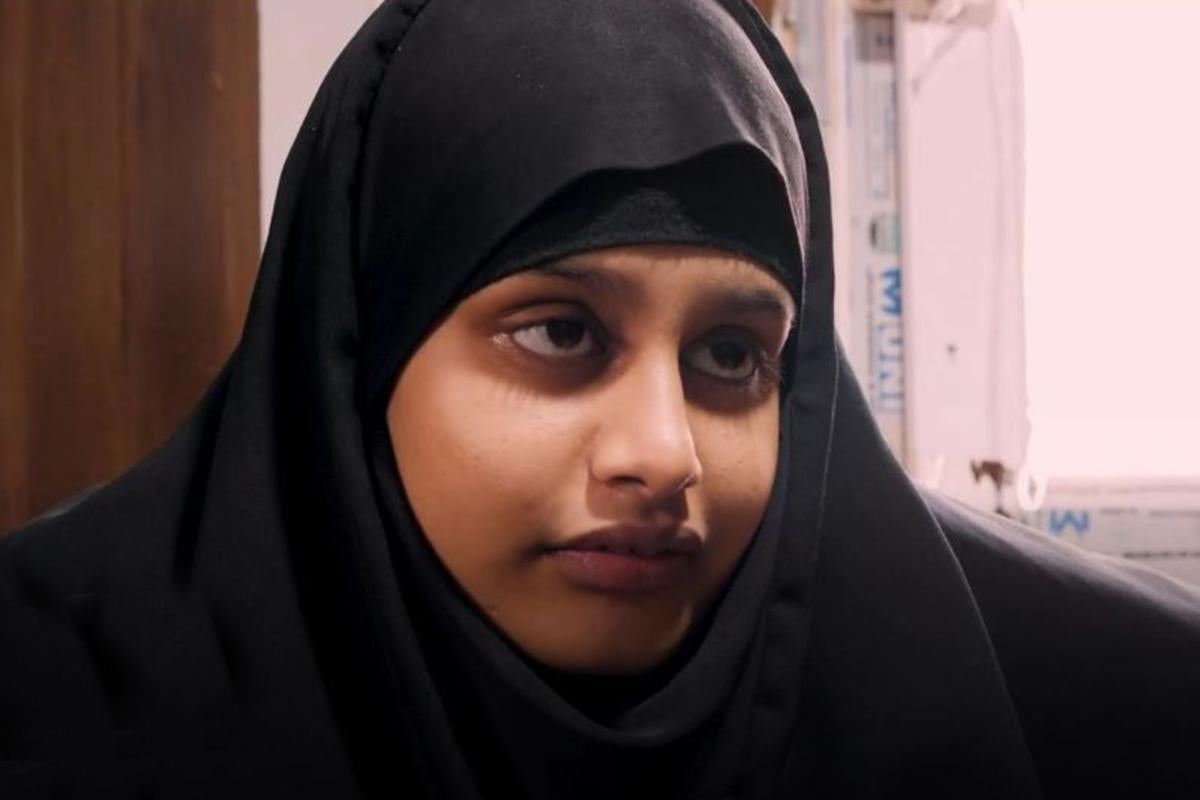Shamima Begum: Government ‘cannot assume Isis bride is a terror threat’, Supreme Court told
Judges deciding whether former Isis bride should be allowed to return to UK to fight for British citizenship

The government cannot “assume” that Shamima Begum will pose a terror threat if she is allowed to return to Britain, the Supreme Court has been told.
Lawyers representing the former Isis bride, who travelled to Syria when she was 15, argued that she should be allowed to enter the UK to appeal against the removal of her British citizenship.
Lord Pannick QC told judges that if the request is refused, Begum’s citizenship should be reinstated because she has been “denied a meaningful appeal”.
“In those circumstances, unless a solution is found, her deprivation order cannot lawfully continue,” he said on Tuesday.
Begum is currently detained in a Syrian camp for women and children who were caught leaving Isis territory.
The former London schoolgirl lived under Isis rule for almost four years before being found by a journalist in February 2019.
Sajid Javid, then the home secretary, removed her British citizenship shortly afterwards for national security reasons.
A barrister representing his successor Priti Patel previously told the Supreme Court that Begum had “aligned herself with Isis” and that her return to Britain would “expose the public to an increased risk of terrorism”.
But Lord Pannick, representing Begum, suggested those assertions would be challenged in any future appeal over her citizenship.
“It cannot be assumed, and indeed it will be an issue on any appeal, that because Begum travelled to Syria and because there is evidence she aligned herself with Isis it therefore follows that she constitutes a continuing threat,” he added.
The barrister said safeguarding mechanisms had “failed” before Begum left the UK with two school friends in 2015, and that her “particular circumstances” should be taken into account.
“It is not case that everyone who has travelled to Syria and aligned with Isis poses any security risk,” Lord Pannick said, pointing to a 2019 Home Office document.
It said that of around 900 people who left Britain to engage in the conflict in Syria and Iraq since 2014, around a fifth had been killed and 40 per cent had returned.
The majority had been assessed to pose a low security risk or none, the document said, but added that those who chose to remain with Isis for longer were more dangerous than people who returned earlier in the conflict.
On Monday, a barrister representing the home secretary argued that anyone who lived under Isis control is “likely to have developed a capability to carry out an attack independently” and would pose a terror threat to the UK if they returned.
Sir James Eadie QC drew judges’ attention to passages of an interview with The Times where Begum said she did not regret travelling to Syria, and that seeing severed heads in a bin “didn't faze me at all”.
But Lord Pannick highlighted a later interview with the Daily Mail where Begum said she made the comments to “protect herself from violence from supporters of Isis in the camp”, which she was later moved out of.
He said that if Begum, now 21, was permitted to enter the UK for her citizenship appeal any terror threat would be “manageable” through the use of counterterror powers.
“If Begum had parents who did not arrive from another country such as Bangladesh, and if that other country had different citizenship rules the secretary of state would not be able to take her citizenship away,” he added.
“The government depends on Terrorism Prevention and Investigation Measures (TPIMs) and on prosecution to protect this country from British citizens who return from abroad after aligning with Isis and there is a substantial number of such people [...].
“There’s every reason why Begum’s right to a meaningful appeal should be facilitated by her return, with those measures utilised to such an extent as the security services feel appropriate.”
Begum’s lawyers argue that she cannot launch a “fair and effective” appeal over her British citizenship from Syria, because she is unable to communicate properly with lawyers or take part in proceedings.
The court heard that mobile phones are not permitted in the camp and those using them illicitly may be beaten or punished using isolation.
Lord Pannick said there was no facility to make or receive phone calls, and the way Begum has so far given limited instructions to lawyers was “confidential”.
Sir James previously argued that her difficulties were “self-inflicted” by the decision to join Isis and remain with the terrorist group until it lost its last pockets of territory.
Begum was nine months pregnant when a journalist found her in the al-Hawl camp in northern Syria last year, and her baby son later died.
Lawyers appealed the decision to remove her British citizenship, accusing the government of making her stateless and exposing her to the risk of death or inhuman and degrading treatment.
They appealed to the Special Immigration Appeals Commission (SIAC) but it ruled the move lawful and said Begum had not been made stateless.
The case was then taken to the Court of Appeal, which ruled that she should be allowed to return to the UK to appeal against the removal of her British citizenship.
The Home Office immediately moved to appeal that judgment to the Supreme Court, staying its effects.
The UN Special Rapporteur on Counter Terrorism has intervened in the case, as have the Liberty and Justice human rights groups.
Five senior judges, including the Supreme Court president Lord Reed, have reserved their judgment.



